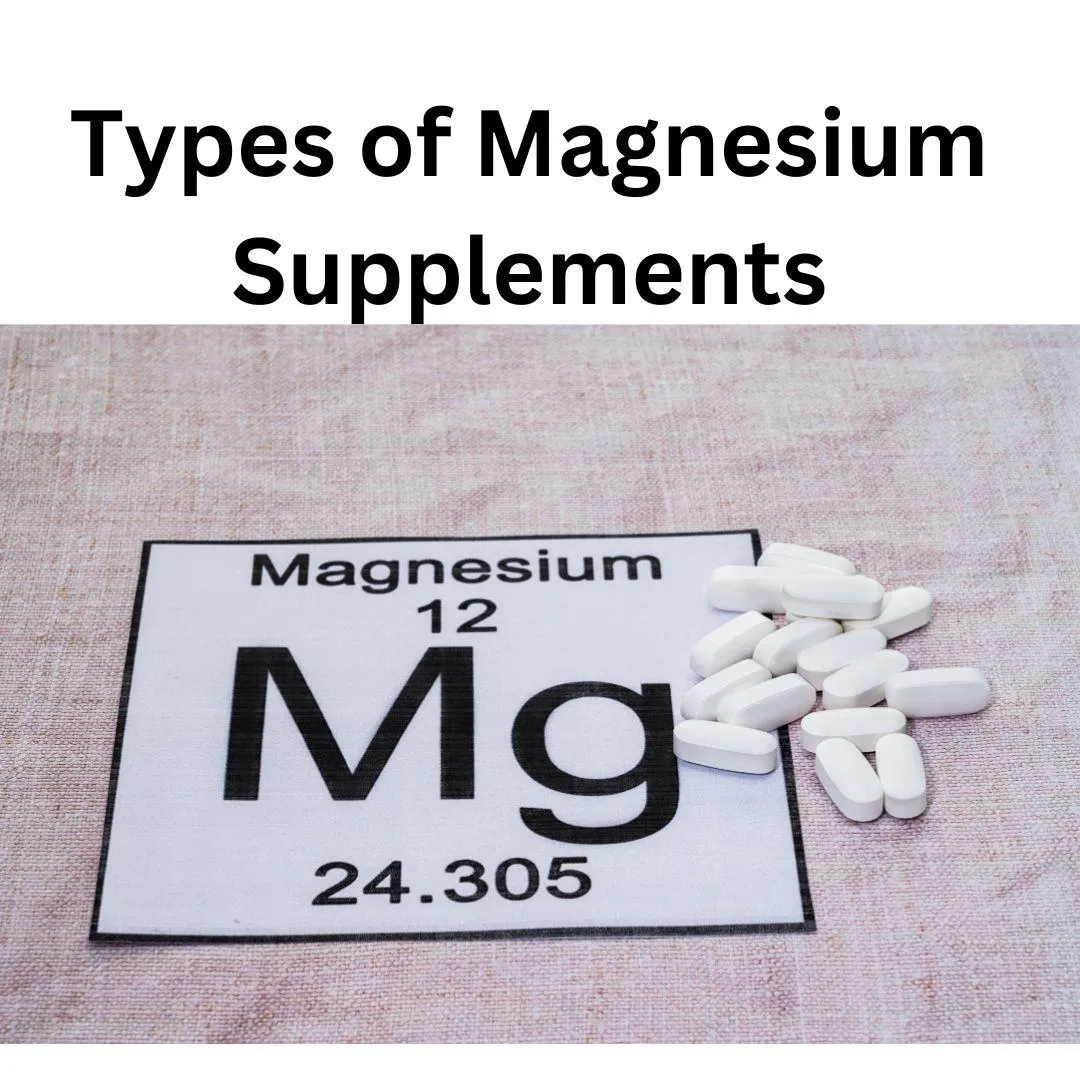*Open to Florida Residents
Blog
Blog

Comprehensive Guide to Magnesium Supplements: Types, Benefits, and Their Role in Managing Menopausal Symptoms
Magnesium is an essential mineral involved in numerous biochemical processes in the human body, ranging from nerve function to energy production. For women experiencing menopause, magnesium has attracted attention as a potential aid for symptoms like hot flashes, sleep disturbances, and mood swings. However, with a variety of magnesium supplements available, choosing the right one can be overwhelming. This guide explores the different types of magnesium supplements, their benefits, and their specific relevance to alleviating menopausal symptoms.
Why is Magnesium Important?
Magnesium is a cofactor in more than 300 enzymatic reactions in the body, including those regulating muscle and nerve function, blood sugar levels, and blood pressure. A deficiency in magnesium can lead to symptoms such as muscle cramps, fatigue, anxiety, and in some cases an exacerbation of menopausal symptoms. During menopause, hormonal fluctuations can affect magnesium levels, making supplementation a key consideration for many women.
Types of Magnesium Supplements and Their Benefits
Magnesium Oxide: Magnesium oxide is one of the most common and affordable forms of magnesium. It contains a high concentration of elemental magnesium but has lower bioavailability compared to other forms.
Benefits: Primarily used for alleviating constipation due to its strong laxative effect. It also supports bone health.
Drawbacks: Its low absorption rate means it may not be the best option for managing systemic symptoms of menopause like hot flashes.
Magnesium Citrate: Magnesium citrate is a highly bioavailable form of magnesium, meaning it is easily absorbed by the body. It is often used to address magnesium deficiencies.
Benefits: Helps with muscle relaxation, reducing cramps, and supporting healthy sleep patterns. Its calming effects can be beneficial for mood swings associated with menopause.
Relevance to Hot Flashes: Magnesium citrate may help regulate the nervous system, potentially reducing the frequency and intensity of of hot flashes.
Magnesium Glycinate: This form of magnesium bound to glycine; an amino acid known for its calming properties. Magnesium glycinate is highly absorbable and gentle on the stomach.
Benefits: Excellent for reducing anxiety, promoting restful sleep, and alleviating symptoms of depression. Its muscle-relaxing properties can also help with tension headaches and cramps.
Relevance to Hot Flashes: Magnesium glycinate is particularly effective for women experiencing hot flashes at night, as its calming effects can improve sleep quality and reduce nighttime sweating.
Magnesium Malate: Magnesium malate combines magnesium with malic acid, a compound involved in energy production.
Benefits: Known for its role in reducing fatigue and muscle pain, it is often recommended for people with fibromyalgia or chronic fatigue syndrome.
Relevance for Menopausal Symptoms: Its energizing properties can combat menopause-related fatigue, improving overall quality of life.
Magnesium Taurate: This form combines magnesium with taurine, an amino acid that supports cardiovascular health.
Benefits: Improves heart health, regulates blood pressure, and promotes relaxation.
Relevance for Menopausal Symptoms: By supporting cardiovascular function and calming the nervous system, magnesium taurate can help stabilize mood and reduce stress-induced hot flashes.
Magnesium Threonate: A newer form of magnesium known for its ability to cross the blood brain barrier effectively.
Benefits: Enhances cognitive function, memory and learning. It is often used to support brain health and combat age-related cognitive decline.
Relevance to Menopause Symptoms: Its impact on the brain may help regulate the hypothalamus, a key player in controlling body temperature, potentially decreasing hot flashes.
Magnesium Chloride: Magnesium chloride is commonly used in topical applications and oral supplements.
Benefits: Easily absorbed and supports overall health. Topical magnesium chloride can soothe sore muscles and improve skin health.
Relevance for Menopause Symptoms: Topical application may provide localized relaxation and stress reduction.
Magnesium Sulfate: Typically used in baths, magnesium sulfate is absorbed through the skin.
Benefits: Relieves muscle tension, promotes relaxation, and soothes stress.
Relevance to Menopause Symptoms: A warm Epsom Salt bath before bed may help reduce nighttime hot flashes by relaxing the body and lowering stress levels.
Magnesium L-Threonate: This advance form of magnesium has been shown to support brain health and neuroplasticity.
Benefits: Improves mental clarity, reduces brain fog, and supports emotional well-being.
Relevance to Menopause Symptoms: Its ability to improve mood and reduce stress can make it a helpful addition to managing menopausal symptoms.
How can Magnesium Help with Hot Flashes?
Hot flashes are a hallmark symptom of menopause, characterized by sudden sensation of heat, sweating, and flushing. While the exact causes of hot flashes remain unclear, they are thought to result from changes in the body’s thermoregulatory system due to fluctuating estrogen levels. Many women turn to magnesium to help with hot flash symptoms. Magnesium’s role in regulating the nervous system and supporting overall hormonal balance makes it a valuable tool in managing this symptom.
How does Magnesium Help?
Nervous system Regulation: Magnesium helps modulate the hypothalamus, the brain’s temperature control center, reducing the intensity of hot flashes.
Stress Reduction: Stress is a known trigger for hot flashes. Magnesium’s calming effects can lower stress levels, reducing their frequency.
Improved Sleep: By enhancing relaxation and reducing nighttime awakenings, magnesium supports better sleep, indirectly helping with nighttime hot flashes.
Best Forms of Magnesium for Menopausal Symptoms:
Magnesium Glycinate: Best for nighttime hot flashes and overall relaxation.
Magnesium Citrate: Effective for mood stabilization and nervous system support.
Magnesium Taurate: Ideal for women with stress-related menopausal issues.
What Dosage Should You Take?
The recommended daily allowance (RDA) for magnesium varies by age and health status but is generally around 500 mg for adult women. During menopause women may benefit from slightly higher doses but it is essential to consult a healthcare provider before starting supplementation.
Tips for Safe Supplementation:
Start Low and Go Slow: Begin with a lower dose to assess tolerance.
Watch for Side Effects: Excessive magnesium can cause diarrhea or gastrointestinal discomfort.

Comprehensive Guide to Magnesium Supplements: Types, Benefits, and Their Role in Managing Menopausal Symptoms
Magnesium is an essential mineral involved in numerous biochemical processes in the human body, ranging from nerve function to energy production. For women experiencing menopause, magnesium has attracted attention as a potential aid for symptoms like hot flashes, sleep disturbances, and mood swings. However, with a variety of magnesium supplements available, choosing the right one can be overwhelming. This guide explores the different types of magnesium supplements, their benefits, and their specific relevance to alleviating menopausal symptoms.
Why is Magnesium Important?
Magnesium is a cofactor in more than 300 enzymatic reactions in the body, including those regulating muscle and nerve function, blood sugar levels, and blood pressure. A deficiency in magnesium can lead to symptoms such as muscle cramps, fatigue, anxiety, and in some cases an exacerbation of menopausal symptoms. During menopause, hormonal fluctuations can affect magnesium levels, making supplementation a key consideration for many women.
Types of Magnesium Supplements and Their Benefits
Magnesium Oxide: Magnesium oxide is one of the most common and affordable forms of magnesium. It contains a high concentration of elemental magnesium but has lower bioavailability compared to other forms.
Benefits: Primarily used for alleviating constipation due to its strong laxative effect. It also supports bone health.
Drawbacks: Its low absorption rate means it may not be the best option for managing systemic symptoms of menopause like hot flashes.
Magnesium Citrate: Magnesium citrate is a highly bioavailable form of magnesium, meaning it is easily absorbed by the body. It is often used to address magnesium deficiencies.
Benefits: Helps with muscle relaxation, reducing cramps, and supporting healthy sleep patterns. Its calming effects can be beneficial for mood swings associated with menopause.
Relevance to Hot Flashes: Magnesium citrate may help regulate the nervous system, potentially reducing the frequency and intensity of of hot flashes.
Magnesium Glycinate: This form of magnesium bound to glycine; an amino acid known for its calming properties. Magnesium glycinate is highly absorbable and gentle on the stomach.
Benefits: Excellent for reducing anxiety, promoting restful sleep, and alleviating symptoms of depression. Its muscle-relaxing properties can also help with tension headaches and cramps.
Relevance to Hot Flashes: Magnesium glycinate is particularly effective for women experiencing hot flashes at night, as its calming effects can improve sleep quality and reduce nighttime sweating.
Magnesium Malate: Magnesium malate combines magnesium with malic acid, a compound involved in energy production.
Benefits: Known for its role in reducing fatigue and muscle pain, it is often recommended for people with fibromyalgia or chronic fatigue syndrome.
Relevance for Menopausal Symptoms: Its energizing properties can combat menopause-related fatigue, improving overall quality of life.
Magnesium Taurate: This form combines magnesium with taurine, an amino acid that supports cardiovascular health.
Benefits: Improves heart health, regulates blood pressure, and promotes relaxation.
Relevance for Menopausal Symptoms: By supporting cardiovascular function and calming the nervous system, magnesium taurate can help stabilize mood and reduce stress-induced hot flashes.
Magnesium Threonate: A newer form of magnesium known for its ability to cross the blood brain barrier effectively.
Benefits: Enhances cognitive function, memory and learning. It is often used to support brain health and combat age-related cognitive decline.
Relevance to Menopause Symptoms: Its impact on the brain may help regulate the hypothalamus, a key player in controlling body temperature, potentially decreasing hot flashes.
Magnesium Chloride: Magnesium chloride is commonly used in topical applications and oral supplements.
Benefits: Easily absorbed and supports overall health. Topical magnesium chloride can soothe sore muscles and improve skin health.
Relevance for Menopause Symptoms: Topical application may provide localized relaxation and stress reduction.
Magnesium Sulfate: Typically used in baths, magnesium sulfate is absorbed through the skin.
Benefits: Relieves muscle tension, promotes relaxation, and soothes stress.
Relevance to Menopause Symptoms: A warm Epsom Salt bath before bed may help reduce nighttime hot flashes by relaxing the body and lowering stress levels.
Magnesium L-Threonate: This advance form of magnesium has been shown to support brain health and neuroplasticity.
Benefits: Improves mental clarity, reduces brain fog, and supports emotional well-being.
Relevance to Menopause Symptoms: Its ability to improve mood and reduce stress can make it a helpful addition to managing menopausal symptoms.
How can Magnesium Help with Hot Flashes?
Hot flashes are a hallmark symptom of menopause, characterized by sudden sensation of heat, sweating, and flushing. While the exact causes of hot flashes remain unclear, they are thought to result from changes in the body’s thermoregulatory system due to fluctuating estrogen levels. Many women turn to magnesium to help with hot flash symptoms. Magnesium’s role in regulating the nervous system and supporting overall hormonal balance makes it a valuable tool in managing this symptom.
How does Magnesium Help?
Nervous system Regulation: Magnesium helps modulate the hypothalamus, the brain’s temperature control center, reducing the intensity of hot flashes.
Stress Reduction: Stress is a known trigger for hot flashes. Magnesium’s calming effects can lower stress levels, reducing their frequency.
Improved Sleep: By enhancing relaxation and reducing nighttime awakenings, magnesium supports better sleep, indirectly helping with nighttime hot flashes.
Best Forms of Magnesium for Menopausal Symptoms:
Magnesium Glycinate: Best for nighttime hot flashes and overall relaxation.
Magnesium Citrate: Effective for mood stabilization and nervous system support.
Magnesium Taurate: Ideal for women with stress-related menopausal issues.
What Dosage Should You Take?
The recommended daily allowance (RDA) for magnesium varies by age and health status but is generally around 500 mg for adult women. During menopause women may benefit from slightly higher doses but it is essential to consult a healthcare provider before starting supplementation.
Tips for Safe Supplementation:
Start Low and Go Slow: Begin with a lower dose to assess tolerance.
Watch for Side Effects: Excessive magnesium can cause diarrhea or gastrointestinal discomfort.
Let me help you achieve your goals.
Disclaimer: We understand that every individual's experience is unique and results may vary depending on various factors, such as attitude, adaptability, personal history, and overall health. For your safety and well-being, we highly recommend consulting your physician before beginning any program. At Elite Sexual Hormone Health, we do not diagnose, treat, or prescribe any medical or psychological disorders. We urge you to seek the care of a qualified physician or psychotherapist if you suffer from any psychological or medical disorder. Thank you for choosing Elite Sexual Hormone Health as your partner in your journey towards wellness.
© 2025, Elite Sexual Hormone Health. All rights reserved.
Privacy Policy | Terms of Service | Disclaimer
© 2025, Elite Sexual Hormone Health. All rights reserved.
Website by Hypnotherapy Accelerator





